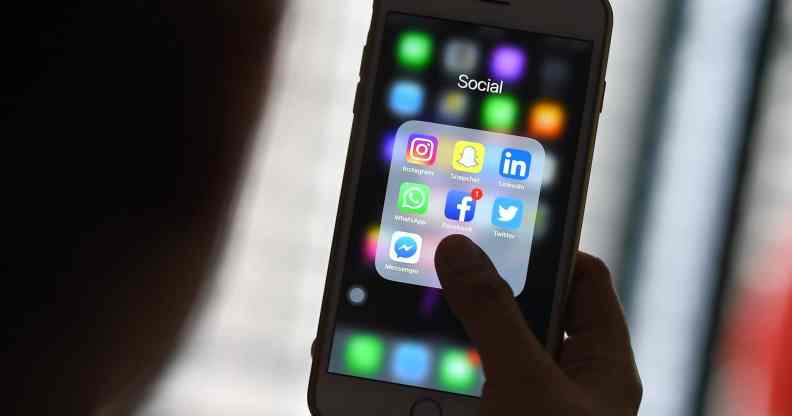TikTok, Facebook, Instagram, YouTube and Twitter ‘categorically unsafe’ for LGBT+ people

Social media sites are “categorically unsafe” for queer users, the damning report found (Manan VATSYAYANA/AFP/ Getty)
Social media sites are "categorically unsafe" for queer users, the damning report found (Manan VATSYAYANA/AFP/ Getty)
Facebook, Twitter, Instagram, TikTok and YouTube are all “categorically unsafe” for LGBT+ people, according to a damning new study from GLAAD.
GLAAD had originally planned to give grades for each site as part of a new social media safety index, but this was scrapped when it became apparent “they’d all fail, quite frankly”.
“They are categorically unsafe, across the board,” GLAAD president and CEO Sarah Kate Ellis said in an interview with Axios on HBO on Sunday (9 May).
For the report, GLAAD’s team of outside experts examined the policies of each of the leading social media sites and their track record of enforcing them.
What they found was that every single one of the platforms are failing to protect LGBT+ users from being harassed and threatened – and what happens online isn’t staying online.
“There are real world consequences to what happens online,” Ellis said. “There are direct lines you can draw between the over 100 anti-trans bills that are now circulating at the state [level] and what’s being produced and pushed out within the social media world.
“I think that there are direct lines to, unfortunately, suicides of our community,” she added.
She highlighted the disconnect between the LGBT-inclusive ethos espoused by all the top platforms, which nonetheless allow for harmful misinformation and harassment to spread unchecked.
“What shocked me the most about all of this is at the end of the day, these companies have the tools to stop it,” she said.
Ellis noted that there are “absolutely bright spots,” with LGBT+ people finding support online. “However, the challenge right now is that the negative is outweighing the positive.”
GLAAD’s report lays out a variety of recommendations for all the platforms, including specific suggestions for each service.
“This is about less watchdogging, more partnering with these platforms to get it right,” Ellis explained. “We’re looking for real, concrete changes in the next year,” after which GLAAD will issue the aforementioned grades.
Responding to the report, Facebook and Instagram said in a statement to Axios that they “believe deeply in the representation of and visibility for the LGBT+ community”.
“Finding the right balance between giving voice and taking action on harmful content is hard,” said CMO Alex Schultz. “This is why we partner with experts, non-profits and other stakeholders – like GLAAD – to try to get it right.”
A spokesperson for YouTube highlighted the platform’s “significant progress” in removing hateful and harassing anti-LGBT+ content, but acknowledged that the work is ongoing and said they “appreciate the thoughtful feedback from GLAAD”.
Twitter also welcomed GLAAD’s initiative, and said it had engaged with the group to understand their requests and commit to an open dialogue.
TikTok’s statement said it is committed to supporting and uplifting LGBT+ voices and as it cares deeply about “fostering a welcoming and supportive experience for everyone”.
“We share GLAAD’s dedication to the safety of the LGBTQ+ community and will continue working with GLAAD and other LGBTQ+ organisations to help inform and strengthen our work,” their spokesperson added.

